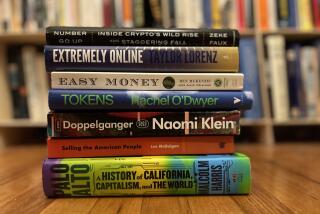Shrinking serendipity
- Share via
POKER, I’M TOLD, is dealing out a royal flush for cable TV ratings. But elsewhere in our media culture, transactions governed by chance seem to be holding a dead hand.
Consider, for instance, the apparently waning sway of serendipity. Coined by 18th century British author Horace Walpole, the term derives from a Persian fairy-tale, “The Princes of Serendip,” in which the story’s three namesake princes “were always making discoveries, by accident and sagacity, of things they were not in quest of.”
Of course, in the eternal contest with her rival, destiny, serendipity hasn’t yet thrown in her hand. Even so, in at least one realm of our lives -- the one filled by that gaseous presence we call the media -- we are witnessing a digital assault on serendipity and, if present trends hold, the eventual demise of accidental discovery.
We sign on to Internet sites that we fine-tune to deliver news only on subjects we already know about. And music sites where we fill our iPods with private playlists of already familiar songs. There are online and on-air outlets that, like some fire hydrant left open on a scorching summer day, ceaselessly drench us in political opinions we already hold. Even our search engines often end up narrowing our world.
Sledding through a dizzying blur of algorithms, our Googles and Yahoos in seconds draw to us more information than our ancestors had access to during their entire lifetimes. But with too few surprises. Dispatch into the ether a handful of words -- a historical event, lyrics from a popular song, or the name of a person you met 15 minutes ago -- and presto! Flickering on the screen of your laptop comes a list of electronic documents containing that search phrase -- scores, sometimes millions of items, all rated and ranked in descending order of relevancy to your studied interest or casual whim.
Of course, specialization in media is nothing new. In the serial preoccupations of my childhood, I acquired magazines and catalogs devoted to aspiring magicians, short-wave radio hobbyists, Beatles fans and Boy Scouts. And one can even argue -- no, apodictically state -- that search engines save us time and make our lives easier.
I’m a historian; give me several hours and I’ll share with you the myriad ways that e-mail, Web pages, listservs and databases simplify my work. I have quicker access to random facts and can more readily, and cheaply, consult with fellow scholars. Beyond that, I can reliably confirm whether a given manuscript or roll of microfilm exists and, if so, where.
But I’m also aware of what the Internet can’t do. Old-fashioned slogging through documents and microfilm still dominates my research. Contrary to a widespread assumption, most of history’s primary sources -- diaries, letters and the like -- have not been loaded onto the Internet. So when it comes to getting at the past in all its messy, vexing, contradictory glory, I still prefer the intellectual Big Sky Country of open-stack libraries over the search engine parked atop a Starbucks table.
Libraries give me knowledge and serendipity. Among their other virtues, they offer the joy -- unparalleled on relevancy-driven search engines and databases -- of searching down one book only to run into another by an author or on a topic utterly unrelated, and then happily spending the next few hours sitting in the aisle reveling in the bracing new world that volume unfolds.
The point here is not that our Googles, iPods and the like can’t be used to broaden our worlds. But, by my lights, we too often use these technologies in ways that reinforce the familiar over the new, the specialized over the general.
I worry that as these cyber-conveniences stream through our lives, they atomize us. I worry that in their magnitude and pervasiveness, they hasten our transformation from social actors into solo consumers. Finally, I’m concerned that this growing exclusion of serendipity from our lives and learning could leave us short of the sort of broad knowledge of how things happen, the way things work -- in our neighborhoods and the world at large -- that citizens of a democratic republic require.
Beyond that, estranged from one another, each dancing to his or her own solitary iPod soundtrack, we run the risk of becoming unable to understand opposing points of view. And if that happens, we’ll find ourselves incapable, when confronted by problems, of fashioning the sort of consensus solutions essential to democratic society.
But that’s hardly the worst of it: As the poker players scrutinizing their cards will tell you -- if only you could get their attention -- a life drained of chance is no life at all.
More to Read
The biggest entertainment stories
Get our big stories about Hollywood, film, television, music, arts, culture and more right in your inbox as soon as they publish.
You may occasionally receive promotional content from the Los Angeles Times.










